Twochildpolicyandbabyboom二孩讲义政策及婴儿潮
英语作文二孩政策
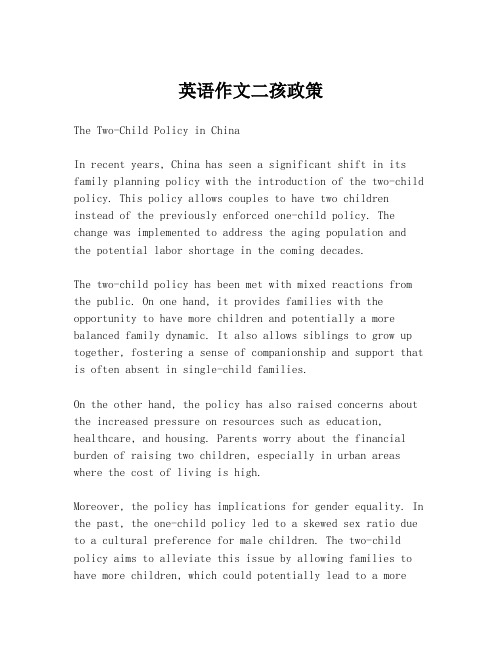
英语作文二孩政策The Two-Child Policy in ChinaIn recent years, China has seen a significant shift in its family planning policy with the introduction of the two-child policy. This policy allows couples to have two children instead of the previously enforced one-child policy. The change was implemented to address the aging population and the potential labor shortage in the coming decades.The two-child policy has been met with mixed reactions from the public. On one hand, it provides families with the opportunity to have more children and potentially a more balanced family dynamic. It also allows siblings to grow up together, fostering a sense of companionship and support that is often absent in single-child families.On the other hand, the policy has also raised concerns about the increased pressure on resources such as education, healthcare, and housing. Parents worry about the financial burden of raising two children, especially in urban areas where the cost of living is high.Moreover, the policy has implications for gender equality. In the past, the one-child policy led to a skewed sex ratio due to a cultural preference for male children. The two-child policy aims to alleviate this issue by allowing families to have more children, which could potentially lead to a morebalanced gender distribution.In conclusion, the two-child policy is a significant step towards addressing demographic challenges in China. While it presents both opportunities and challenges, it is an important policy that reflects the evolving social and economic landscape of the country. It is crucial for the government to support this policy with comprehensive measures to ensure that it benefits the families and the society as a whole.。
二胎政策
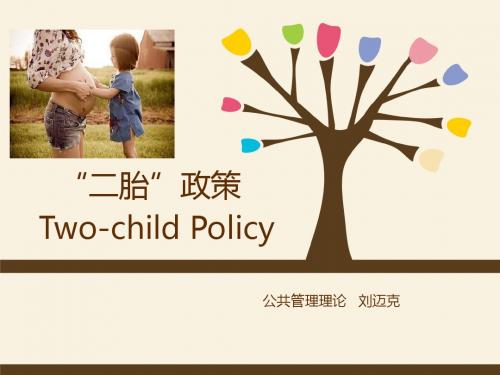
二胎政策 与社会经 济的可持 续发展
汪妍(2014)
应对用工荒问题,实现经 济可持续发展 消除社会不稳定因素,实 现经济可持续发展 有 偏效 高解 问决 题性 别 比 有 及效 养人 老口 问老 题龄 化
浅析二胎政策对我国社会保障制度的影响
徐 嘉 蔚 ( 2013 ) 一、从长远看可缓解机制转轨过程中存在巨大 的社会养老保险金缺口问题; 二、可避免中国过早进入人口负增长阶段,减 轻我国社会保障制度压力;
我国人口老龄化趋势加快,计划生育政策实施近 三十年,出生率有所降低;随着社会经济的发展,
物质文化生活水平不断提高,一定程度的人口增长
有利于促进经济发展,提高劳动率。 “4+2+1”的家庭模式加重了养老负担,二胎政 策更有利于养老问题的解决,缓解独生子女养老压 力,但是二胎也会带来经济压力,以及家庭教育、 儿女抚养等问题。 城市居民独生子女较多,二胎政策更应该放宽很 多,但是生不生,还是要考虑到夫妻双方的经济能 力、抚养情况等,以及双方老人的意见,并结合当 地的生育政策,做出最合适的决定。
2012年10月26日,中国发展研究基金会发布的《人口 形势的变化和人口政策的调整》报告特别提出,第一 步,在城市地区和严格执行一孩政策的农村地区即刻 放开二胎;第二步,2015年,在实行“一孩半”政策 的地区放开二胎,实现全国全面放开二胎的目标。
实施 难度 学者 观点
1980年党中央公开信中提出可以采取不同的人口 政策;在中国社科院召开研讨会上,计划生育副总 设计师田雪原提出二胎方案;国务院发展研究中心 三位专家在《中国经济时报》发表文章,提出尽快 调整完善人口和计划生育政策;中国生育水平已经 明显低于2.1的更替水平,可考虑全面放开二胎。
来了生育政策有望再度调整,年内出台全面放开二
二孩政策(two-child policy)
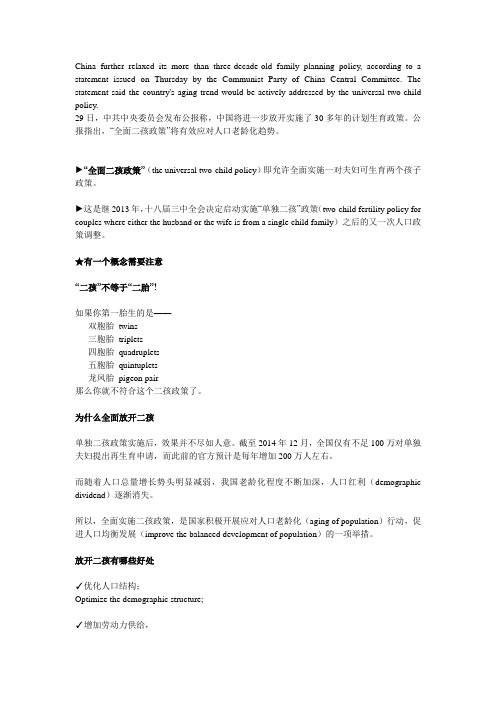
China further relaxed its more than three-decade-old family planning policy, according to a statement issued on Thursday by the Communist Party of China Central Committee. The statement said the country's aging trend would be actively addressed by the universal two-child policy.29日,中共中央委员会发布公报称,中国将进一步放开实施了30多年的计划生育政策。
公报指出,“全面二孩政策”将有效应对人口老龄化趋势。
►“全面二孩政策”(the universal two-child policy)即允许全面实施一对夫妇可生育两个孩子政策。
►这是继2013年,十八届三中全会决定启动实施“单独二孩”政策(two-child fertility policy for couples where either the husband or the wife is from a single child family)之后的又一次人口政策调整。
★有一个概念需要注意“二孩”不等于“二胎”!如果你第一胎生的是——双胞胎twins三胞胎triplets四胞胎quadruplets五胞胎quintuplets龙凤胎pigeon pair那么你就不符合这个二孩政策了。
为什么全面放开二孩单独二孩政策实施后,效果并不尽如人意。
截至2014年12月,全国仅有不足100万对单独夫妇提出再生育申请,而此前的官方预计是每年增加200万人左右。
而随着人口总量增长势头明显减弱,我国老龄化程度不断加深,人口红利(demographic dividend)逐渐消失。
二孩政策 英语作文
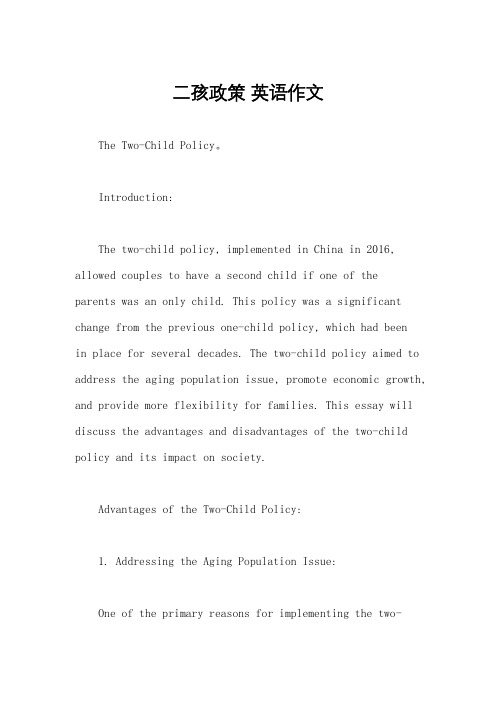
二孩政策英语作文The Two-Child Policy。
Introduction:The two-child policy, implemented in China in 2016, allowed couples to have a second child if one of theparents was an only child. This policy was a significant change from the previous one-child policy, which had beenin place for several decades. The two-child policy aimed to address the aging population issue, promote economic growth, and provide more flexibility for families. This essay will discuss the advantages and disadvantages of the two-child policy and its impact on society.Advantages of the Two-Child Policy:1. Addressing the Aging Population Issue:One of the primary reasons for implementing the two-child policy was to address the aging population issue.With a large number of elderly citizens and a decliningbirth rate, China faced challenges in providing adequate care and support for the aging population. By allowing couples to have a second child, the government hoped to increase the working-age population, which would contribute to economic growth and help sustain social welfare programs.2. Economic Growth:The two-child policy aimed to boost economic growth by increasing the size of the labor force. With a larger population, there would be more individuals available to work, leading to increased productivity and economic output. Additionally, the policy would stimulate consumer demand,as families with two children would have increased spending power, benefiting various sectors of the economy.3. Flexibility for Families:The two-child policy provided more flexibility for families in terms of family planning. It allowed couples tohave more control over their reproductive choices and decide the ideal family size for themselves. Thisflexibility was particularly important for couples who desired to have more than one child but were unable to do so under the previous one-child policy.Disadvantages of the Two-Child Policy:1. Overpopulation Concerns:Critics argue that the two-child policy may lead to overpopulation and strain on resources. China already has a large population, and allowing couples to have a second child could exacerbate issues such as limited arable land, water scarcity, and environmental degradation. These concerns highlight the need for comprehensive planning and sustainable development strategies to mitigate thepotential negative impacts.2. Gender Imbalance:The one-child policy had resulted in a significantgender imbalance, with a preference for male children leading to sex-selective abortions and female infanticide. While the two-child policy aimed to address this issue by allowing families to have a second child, there is still a risk of gender imbalance persisting. It is crucial for the government to continue promoting gender equality and ensuring the rights and well-being of all children.Impact on Society:The implementation of the two-child policy has had a significant impact on Chinese society. It has allowed families to have more children, leading to an increase in the birth rate. This demographic shift has implications for various sectors, including education, healthcare, andsocial welfare. Schools and healthcare facilities may need to accommodate a larger number of children, and social welfare programs may need to be adjusted to supportfamilies with multiple children.Conclusion:The two-child policy in China has both advantages and disadvantages. It addresses the aging population issue, promotes economic growth, and provides more flexibility for families. However, concerns about overpopulation and gender imbalance need to be carefully addressed. The impact of the policy on society necessitates comprehensive planning and adaptation of various sectors to accommodate the changing demographics.。
二胎政策的英语作文
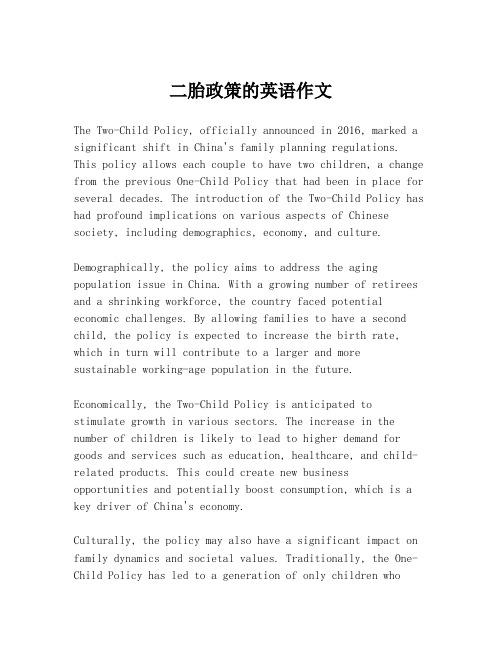
二胎政策的英语作文The Two-Child Policy, officially announced in 2016, marked a significant shift in China's family planning regulations. This policy allows each couple to have two children, a change from the previous One-Child Policy that had been in place for several decades. The introduction of the Two-Child Policy has had profound implications on various aspects of Chinese society, including demographics, economy, and culture.Demographically, the policy aims to address the aging population issue in China. With a growing number of retirees and a shrinking workforce, the country faced potential economic challenges. By allowing families to have a second child, the policy is expected to increase the birth rate, which in turn will contribute to a larger and more sustainable working-age population in the future.Economically, the Two-Child Policy is anticipated to stimulate growth in various sectors. The increase in the number of children is likely to lead to higher demand for goods and services such as education, healthcare, and child-related products. This could create new businessopportunities and potentially boost consumption, which is a key driver of China's economy.Culturally, the policy may also have a significant impact on family dynamics and societal values. Traditionally, the One-Child Policy has led to a generation of only children whooften became the center of their family's attention. With the Two-Child Policy, there is a possibility of a shift in family structures and the way children are raised, potentially fostering a more collaborative and less individualistic approach to upbringing.However, the Two-Child Policy also faces challenges. Not all families are willing or able to have a second child due to financial constraints, career considerations, or personal preferences. Additionally, the policy must be accompanied by supportive measures such as affordable childcare and parental leave to ensure that the benefits are accessible to all segments of society.In conclusion, China's Two-Child Policy represents a major step towards balancing the population and promoting economic and social development. While it presents both opportunities and challenges, its long-term effects on the country's demographics and economy will be closely monitored and analyzed in the coming years.。
对二胎政策英语作文

对二胎政策英语作文The two-child policy, which was implemented in China in 2016, has brought about significant changes in thecountry's population structure. With the relaxation of the one-child policy, more and more couples are choosing to have a second child. This has led to a gradual increase in the birth rate, which is seen as a positive development for the country's future demographic trends.One of the main reasons behind the implementation of the two-child policy was to address the issue of an aging population. With the one-child policy in place for several decades, China was facing the challenge of a shrinking workforce and an increasing number of elderly citizens. By allowing couples to have a second child, the government hopes to mitigate the impact of an aging population and ensure a more balanced demographic structure in the future.In addition to the demographic implications, the two-child policy has also had an impact on social attitudestowards family planning. In the past, there was a strong emphasis on having only one child, and larger families were often seen as burdensome. However, with the introduction of the two-child policy, there has been a shift in societal norms, with more acceptance and support for families with multiple children.Furthermore, the two-child policy has also had economic implications. With more couples choosing to have a second child, there is an increased demand for goods and services related to child-rearing. This has created newopportunities for businesses and has contributed to economic growth in certain sectors.Overall, the implementation of the two-child policy has had far-reaching effects on China's population, society, and economy. It has brought about changes in family planning attitudes, demographic trends, and economic dynamics. As the policy continues to shape the country's future, it will be interesting to see how these changes unfold and impact various aspects of Chinese society.。
二孩政策英语作文
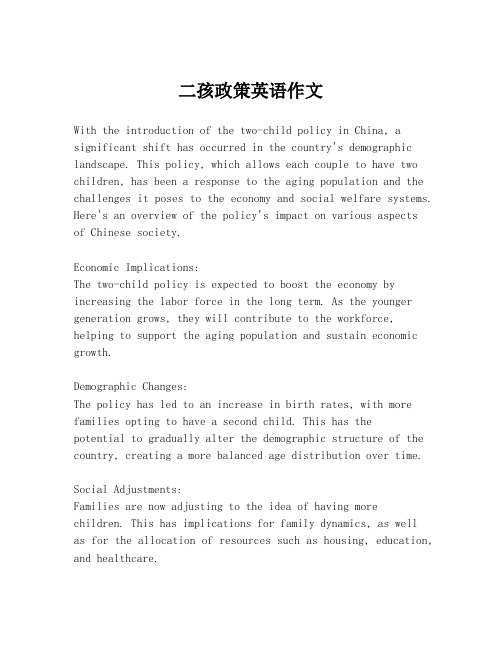
二孩政策英语作文With the introduction of the two-child policy in China, a significant shift has occurred in the country's demographic landscape. This policy, which allows each couple to have two children, has been a response to the aging population and the challenges it poses to the economy and social welfare systems. Here's an overview of the policy's impact on various aspectsof Chinese society.Economic Implications:The two-child policy is expected to boost the economy by increasing the labor force in the long term. As the younger generation grows, they will contribute to the workforce, helping to support the aging population and sustain economic growth.Demographic Changes:The policy has led to an increase in birth rates, with more families opting to have a second child. This has thepotential to gradually alter the demographic structure of the country, creating a more balanced age distribution over time.Social Adjustments:Families are now adjusting to the idea of having more children. This has implications for family dynamics, as wellas for the allocation of resources such as housing, education, and healthcare.Educational Sector:The increase in the number of children will require an expansion of educational facilities and resources. Schools may need to accommodate higher enrollment numbers, which could lead to improvements in the quality and accessibility of education.Healthcare System:The healthcare system will also face challenges in providing maternal and child healthcare services to the growing number of expectant mothers and infants. This could result in the need for increased investment in medical infrastructure and personnel.Gender Equality:The policy aims to reduce gender imbalance by discouraging the preference for male children, which was a side effect of the previous one-child policy. This could contribute to a more equitable society where the value of both genders is recognized.Challenges and Concerns:Despite the potential benefits, the two-child policy also faces challenges. There are concerns about the quality of life for the additional children, given the increased competition for resources. Additionally, there are worries about the short-term economic strain as the government invests in supporting the policy's implications.Conclusion:The two-child policy in China represents a significant steptowards addressing the country's demographic challenges. While it brings about various social, economic, and demographic changes, it also presents a set of challengesthat need to be carefully managed. As the policy continues to unfold, it will be interesting to observe its long-term effects on Chinese society.。
二胎政策的影响英语作文
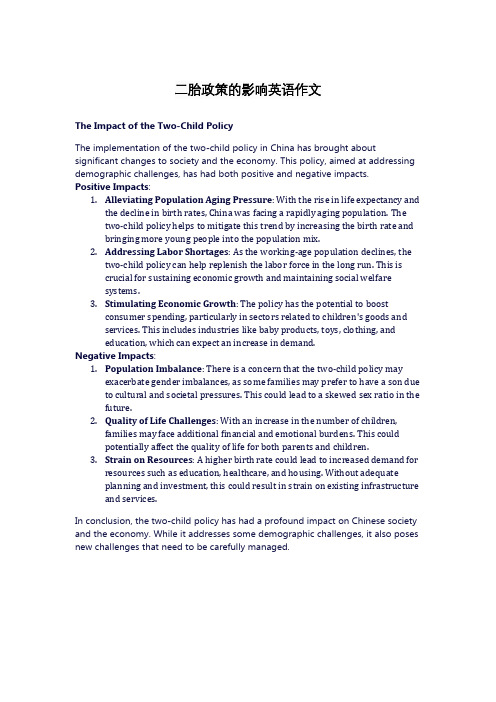
二胎政策的影响英语作文The Impact of the Two-Child PolicyThe implementation of the two-child policy in China has brought about significant changes to society and the economy. This policy, aimed at addressing demographic challenges, has had both positive and negative impacts.Positive Impacts:1.Alleviating Population Aging Pressure: With the rise in life expectancy andthe decline in birth rates, China was facing a rapidly aging population. Thetwo-child policy helps to mitigate this trend by increasing the birth rate andbringing more young people into the population mix.2.Addressing Labor Shortages: As the working-age population declines, thetwo-child policy can help replenish the labor force in the long run. This iscrucial for sustaining economic growth and maintaining social welfaresystems.3.Stimulating Economic Growth: The policy has the potential to boostconsumer spending, particularly in sectors related to children's goods andservices. This includes industries like baby products, toys, clothing, andeducation, which can expect an increase in demand.Negative Impacts:1.Population Imbalance: There is a concern that the two-child policy mayexacerbate gender imbalances, as some families may prefer to have a son due to cultural and societal pressures. This could lead to a skewed sex ratio in the future.2.Quality of Life Challenges: With an increase in the number of children,families may face additional financial and emotional burdens. This couldpotentially affect the quality of life for both parents and children.3.Strain on Resources: A higher birth rate could lead to increased demand forresources such as education, healthcare, and housing. Without adequateplanning and investment, this could result in strain on existing infrastructure and services.In conclusion, the two-child policy has had a profound impact on Chinese society and the economy. While it addresses some demographic challenges, it also poses new challenges that need to be carefully managed.。
二孩政策的英语作文
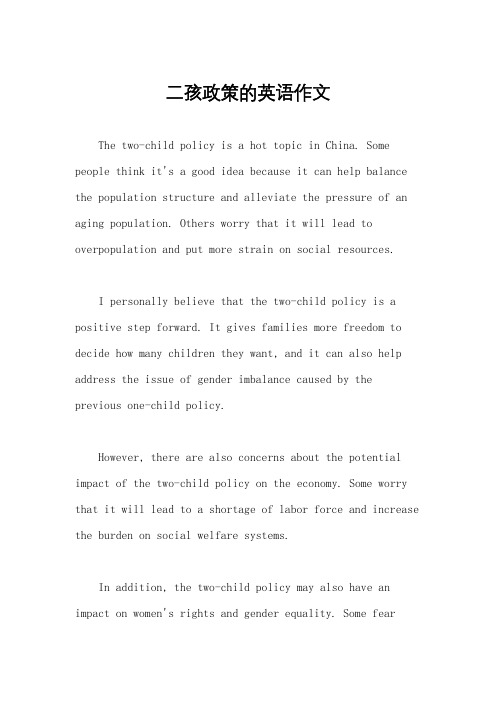
二孩政策的英语作文The two-child policy is a hot topic in China. Some people think it's a good idea because it can help balance the population structure and alleviate the pressure of an aging population. Others worry that it will lead to overpopulation and put more strain on social resources.I personally believe that the two-child policy is a positive step forward. It gives families more freedom to decide how many children they want, and it can also help address the issue of gender imbalance caused by the previous one-child policy.However, there are also concerns about the potential impact of the two-child policy on the economy. Some worry that it will lead to a shortage of labor force and increase the burden on social welfare systems.In addition, the two-child policy may also have an impact on women's rights and gender equality. Some fearthat it will put more pressure on women to balance work and family responsibilities, and may even lead todiscrimination in the workplace.Overall, the two-child policy is a complex issue with both positive and negative aspects. It's important for the government to carefully monitor its implementation and make adjustments as needed to ensure that it benefits the society as a whole.。
2023年全面放开二孩政策讲稿范本

2023年全面放开二孩政策讲稿范本尊敬的各位领导、亲爱的同事们:大家好!我今天演讲的主题是“2023年全面放开二孩政策”。
近年来,我国经济快速发展,人民生活水平显著提高,但也面临着人口老龄化问题和人口结构失衡的挑战。
为了应对这一挑战,我国在2016年实施了全面放开二孩政策,这一举措极大地促进了人口的整体增长和结构优化。
然而,在当前形势下,进一步放开二孩政策迫在眉睫。
首先,进一步放开二孩政策能够提升人口素质。
人口是国家的核心资源,而人口素质又是一个国家发展的基础。
研究表明,家庭资源对子女的教育、培养起着重要作用。
有研究发现,独生子女更容易陷入自私自利的状态,对社会责任感的培养较为困难。
而家庭条件好的二孩家庭更能够提供更好的教育和培养条件,培养出具备全面发展素质的子女,为国家的建设和发展提供更强的人才支持。
其次,放开二孩政策能够调整人口结构,缓解人口老龄化压力。
人口老龄化已成为全球性问题,在我国也日益严峻。
数据统计显示,我国60岁及以上人口已超过2.5亿,占总人口的比重达到18%,而且还在继续增长。
随着经济发展和医疗水平提高,人们的寿命不断延长,但生育率的下降使得人口老龄化问题进一步加剧。
为了应对这一问题,我们需要进一步放开二孩政策,提高生育率,缓解人口老龄化压力,保证社会的可持续发展。
再次,放开二孩政策能够促进社会和谐稳定。
传统观念中,子女是家庭的寄托和传宗接代的希望。
独生子女政策的实施导致了家庭出生率的下降,使得家庭结构单一化,子女教育责任过重。
一些老年人由于没有兄弟姐妹的陪伴,生活孤独感更加强烈。
而且在现实生活中,一些独生子女身上承担着太多的期望和压力,容易使其心理承受不了。
因此,进一步放开二孩政策能够有助于缓解家庭压力,增加亲人间的关系和谐度,促进社会和谐稳定。
当然,全面放开二孩政策也会带来一系列的问题和挑战,如儿童教育、医疗资源等问题。
然而,这些问题都可以通过政府和社会的共同努力来解决。
政府可以制定相关政策,增加教育和医疗资源的投入,同时加强儿童保护和权益保障。
二胎政策 英语 作文
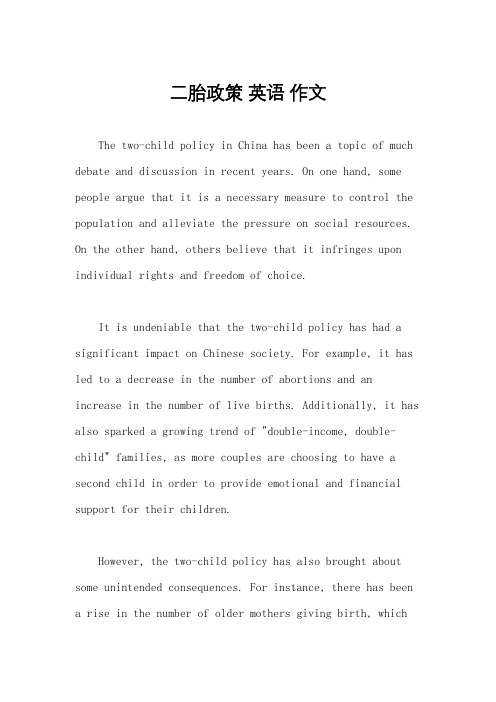
二胎政策英语作文The two-child policy in China has been a topic of much debate and discussion in recent years. On one hand, some people argue that it is a necessary measure to control the population and alleviate the pressure on social resources. On the other hand, others believe that it infringes upon individual rights and freedom of choice.It is undeniable that the two-child policy has had a significant impact on Chinese society. For example, it has led to a decrease in the number of abortions and an increase in the number of live births. Additionally, it has also sparked a growing trend of "double-income, double-child" families, as more couples are choosing to have a second child in order to provide emotional and financial support for their children.However, the two-child policy has also brought about some unintended consequences. For instance, there has been a rise in the number of older mothers giving birth, whichhas raised concerns about the health and well-being of both the mothers and their babies. Furthermore, there are also worries about the potential strain on the education and healthcare systems as the population continues to grow.In conclusion, the two-child policy in China has had both positive and negative effects on society. While it has helped to address some of the challenges associated with overpopulation, it has also raised concerns aboutindividual rights and social welfare. As the debate continues, it is important to carefully consider the implications of such policies and strive to find a balance between population control and personal freedom.。
二孩政策英语作文
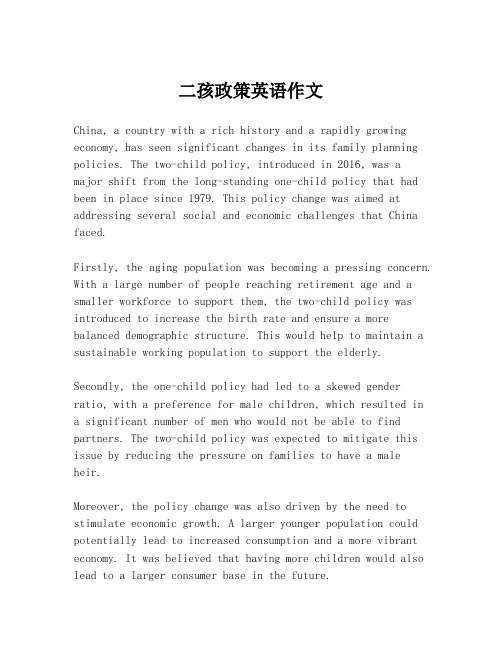
二孩政策英语作文China, a country with a rich history and a rapidly growing economy, has seen significant changes in its family planning policies. The two-child policy, introduced in 2016, was a major shift from the long-standing one-child policy that had been in place since 1979. This policy change was aimed at addressing several social and economic challenges that China faced.Firstly, the aging population was becoming a pressing concern. With a large number of people reaching retirement age and a smaller workforce to support them, the two-child policy was introduced to increase the birth rate and ensure a more balanced demographic structure. This would help to maintain a sustainable working population to support the elderly.Secondly, the one-child policy had led to a skewed gender ratio, with a preference for male children, which resulted in a significant number of men who would not be able to find partners. The two-child policy was expected to mitigate this issue by reducing the pressure on families to have a male heir.Moreover, the policy change was also driven by the need to stimulate economic growth. A larger younger population could potentially lead to increased consumption and a more vibrant economy. It was believed that having more children would also lead to a larger consumer base in the future.However, the two-child policy has not been without its challenges. Many families have expressed concerns about the increased financial burden of raising two children,especially in urban areas where the cost of living is high. Additionally, there has been a debate about the quality of life for children and whether having a sibling is beneficial or detrimental.In conclusion, the two-child policy in China represents a significant shift in the country's approach to population control and family planning. While it has the potential to address demographic and economic challenges, it also presents new social and financial considerations for families. As China continues to evolve, the success and impact of this policy will be closely monitored and analyzed.。
计划生育-二胎政策(英文)

Two Child - Opposition
1.Raising a child is expensive
2.No time to take care of two children
3.Worry about educational resources
4.Having more time to enjoy private space of lovers
Some Problems - Rapid population growth
ck of food 2.Low level of education 3.Family burden 4.Employment difficult 5.Energy and resource issues
How to solve it? - Family Planning
Questions
1.Do you want to have brothers or sisters?
2.Do you want a child or two children or more?
1.Gender imbalance 2.Aging population 3.Loneliness&selfish 4.“4-2-1”family
Now - Two Child Policy
At the end of 2014, China had a population of 1.37 billion people. A total of 800 million of them are employed. But the job market population is expected to drop by 2050.With the two-child policy, an increase in births will ease the labor shortage, the change is meant to balance population development.
二孩政策英语作文

二孩政策英语作文With the introduction of the two-child policy in China, a significant shift has occurred in the country's demographic landscape. This policy, which allows each couple to have two children, has been a response to the aging population and the challenges it poses to the economy and social welfare systems. Here's an overview of the policy's impact on various aspectsof Chinese society.Economic Implications:The two-child policy is expected to boost the economy by increasing the labor force in the long term. As the younger generation grows, they will contribute to the workforce, helping to support the aging population and sustain economic growth.Demographic Changes:The policy has led to an increase in birth rates, with more families opting to have a second child. This has thepotential to gradually alter the demographic structure of the country, creating a more balanced age distribution over time.Social Adjustments:Families are now adjusting to the idea of having more children. This has implications for family dynamics, as wellas for the allocation of resources such as housing, education, and healthcare.Educational Sector:The increase in the number of children will require an expansion of educational facilities and resources. Schools may need to accommodate higher enrollment numbers, which could lead to improvements in the quality and accessibility of education.Healthcare System:The healthcare system will also face challenges in providing maternal and child healthcare services to the growing number of expectant mothers and infants. This could result in the need for increased investment in medical infrastructure and personnel.Gender Equality:The policy aims to reduce gender imbalance by discouraging the preference for male children, which was a side effect of the previous one-child policy. This could contribute to a more equitable society where the value of both genders is recognized.Challenges and Concerns:Despite the potential benefits, the two-child policy also faces challenges. There are concerns about the quality of life for the additional children, given the increased competition for resources. Additionally, there are worries about the short-term economic strain as the government invests in supporting the policy's implications.Conclusion:The two-child policy in China represents a significant steptowards addressing the country's demographic challenges. While it brings about various social, economic, and demographic changes, it also presents a set of challengesthat need to be carefully managed. As the policy continues to unfold, it will be interesting to observe its long-term effects on Chinese society.。
二孩政策 英语作文
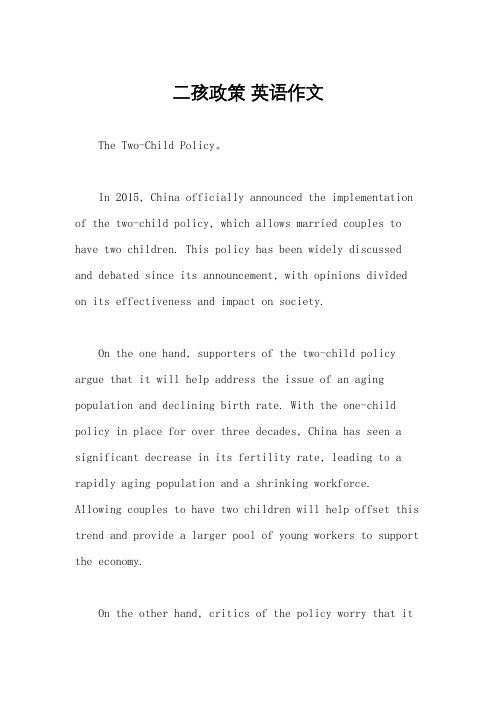
二孩政策英语作文The Two-Child Policy。
In 2015, China officially announced the implementation of the two-child policy, which allows married couples to have two children. This policy has been widely discussed and debated since its announcement, with opinions divided on its effectiveness and impact on society.On the one hand, supporters of the two-child policy argue that it will help address the issue of an aging population and declining birth rate. With the one-child policy in place for over three decades, China has seen a significant decrease in its fertility rate, leading to a rapidly aging population and a shrinking workforce. Allowing couples to have two children will help offset this trend and provide a larger pool of young workers to support the economy.On the other hand, critics of the policy worry that itmay not have the desired effect and could even lead to unintended consequences. For example, some fear that the policy may not be enough to encourage couples to have more children, as many factors such as economic pressures and lifestyle choices also play a role in fertility decisions. Moreover, some worry that the policy may exacerbateexisting gender imbalances and discrimination against girls, as families may still prefer to have a son as their second child.Despite these concerns, it is clear that the two-child policy represents a significant shift in China's population policy and reflects the government's recognition of theneed to address demographic challenges. Whether or not it achieves its intended goals remains to be seen, but it is clear that the policy will have a profound impact on Chinese society for years to come.Personally, I believe that the two-child policy is a step in the right direction, as it provides couples with greater freedom and choice in their reproductive decisions. However, I also believe that the government must take stepsto address the underlying factors that contribute to declining fertility rates, such as high living costs and work pressures. Only by addressing these issues can wetruly create a society that is supportive of families and encourages population growth in a sustainable and equitable manner.。
